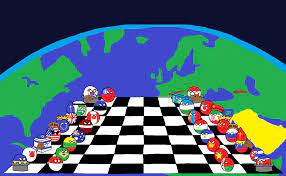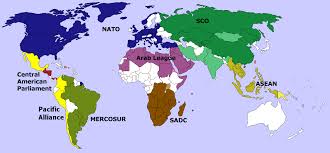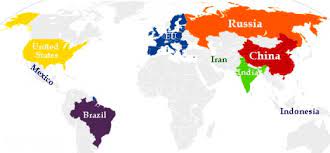
Ground the Common Factor.
The one thing that remains common as one graduates from tactical to strategic level thinking and planning is the - Ground.
At the sub unit level in army, it is important to identify the GTI (Ground of Tactical Importance) to plan the defensive/offensive operations, whereas at higher level it is the Vital Ground and at National level it is about the Geo-Political objectives and Geo- strategy .
Political objectives here do not mean Objectives of a Ruling party. For a layman it would mean ; The Geo-Political objective in 1971 was Liberation of East Pakistan where as military objective was Capture of Dacca which automatically lead to achievement of the Geo- Political objective.
In this regard, I will draw attention to my article titled ; US -Pakistan Cozying up Again !
In which I had mentioned about what Jinnah had felt about the geo-political importance of Pakistan. He had said, while moving his long fingers on the world map –:
“‘Pakistan is the pivot of the world, on which the future position of the world revolves.’”
So, the “Ground” always remains important and only its dimensions and the scope get enlarged.
Therefore, one can now try to define “geo politics” as the study or the application of the influence of political, physical and economic geography on the politics, national power, foreign policy of a state. Therefore, sometimes geo-politics is also used as a loose synonym for international politics, although it does entail its study as well.
In order to comprehend the meaning of Geo-politics, in its entirety, we need to further enlarge its scope.
Geo politics would entail - Area studies, Demographic studies, Political changes and systems, Military affairs, geography/ topography, , interstate relations, global institutions, regional integration, territorial control and Economy ; energy, resources , trade routes, and so on.
The Scope.
Gen Dyal who had captured strategically important HajiPir pass in 1965 war with Pakistan(He was then a Major), When asked about his views on the returning of Pass to Pakistan as per Tashkent agreement. He curtly replied ; “ Indians do not know how to read a map”, implying that the then Indian Govt did not have the capability to analyze the geo-strategic importance of the Pass.
Geo strategy is a sub field of Geo politics. While geopolitics involves studying the geographic and political features of different regions, especially the impact of geography on international politics , geo strategy involves planning, direction of a state’s foreign policy, assigning means for achieving national geo –political goals, concentrating military efforts towards achieving those national goals.
Geo-politics is one subject, which requires consistent study because it is dynamic in nature. There is so much happening at any given time in the world ; technological changes, political changes, economic changes that have an impact on geo-political environment . Even Covid had geo-political implications.
A Senior Fellow at the Foreign Policy Research Institute, aptly described this. He said ; “ If Properly understood, geopolitics is descriptive which helps us understand the world as a whole, and prescriptive in that it suggests strategic courses of action” .
Therefore, Geo politics being dynamic as well as prescriptive and descriptive, it also indicates the links and causal relationships between various changes and developments taking place globally. for instance ,
- US President, Mr Biden has recently shown interest to revive the Joint Comprehensive Plan of Action (JCPOA), known as the Iran Nuclear deal , It is likely to have implications on the relationship with Saudi Arabia and other gulf countries who have often displayed reservations on Iran possessing nuclear weapons.
- Almost One third of world trade takes place through Indo-Pacific ocean region and so this region has recently gained geo-political importance. As the country’s economy grows in its size so its concerns to safe guard its trade routes. China which in last two decades has grown immensely has also emerged as the net importer of oil to meet the needs of its growing economy. However, bulk of its energy needs is met through this route. Thus to safeguard its economic interests it has taken steps to enhance its naval power in this region. This development has a causal relationship with Security challenges to many Nations, including India, who as a result will work out a strategy to cope with the future security requirements.
Study of Causal Relationship Need a Holistic Approach
As the Prof said that Geo politics helps us to understand the world better , so, this cause and effect relationship is to be seen holistically and not in isolation or restricted to a small region. For instance ;
USSR after it crumbled under its own weight and disintegrated in 1991, it gave rise to nationalistic sentiments based on ethnicity and religion and as a result it gave birth to 15 Nations. This led to wide spread violence in some East European countries which also as a result got disintegrated along ethnic and religious lines. This rise in ethnicity and religious sentiments, had a world wide impact and many are still facing it.
Post disintegration, Russia became a second rate power despite possessing huge stock pile of nuclear weapons and strategic missiles. Given the historical experiences many East European countries which withdrew from Warsaw pact and discarded Communism and even the break away provinces of erstwhile USSR, were apprehensive of Russia acting as a bully. So, they, started looking towards West Europe and US for their security. The same happens in Asia –Pacific where Philippines, Japan, Taiwan etc look up to USA for their security against China. In that sense, will the outcome of this ongoing war between Russia and Ukraine not embolden China to do the same with Taiwan or even India, what Russia has done to Ukraine.
All these terms ; Balance of power, Bi polar , uni polar , multi polar world, Monroe doctrine, Nation state system and so on, need to be understood in their entirety and not in isolation.

For example ;
Is the Globalisation, Information technology and rise in Ethnic and Religious sentiments causing a threat to Nation state system that was first articulated in the Treaty of Westphalia in 1648 after Thirty years war.
Post World war and during the Cold war the world was bipolar i.e the countries were divided into two camps. Identification of friend and foe was simple ; “ if you are not with me then you are my enemy”. But there were still a few countries who tried their best to keep themselves away from this power game between the two Big Powers ; USSR and USA.
However, after, Soviet Union crumbled under its own weight in 1991, the decades old Bipolar world order fell into disarray. USA, the economic and military power house became the sole superpower. Many nations who were then not in the US camp had to realign their geo strategic policies and India was one of them. The Look East policy, looking beyond Russia and the need to develop relations with Israel, became a necessity in 90s for Indian policy makers.
However, Russia still considers the breakaway region to be a component within its Sphere of Influence, and vital to their security interests. Like India feels about Srilanka, Bhutan, Nepal, Bangladesh and even Maldives. The concept is similar to the Monroe Doctrine, that US had conceptualized in Latin America, which is now being challenged by China now. China has successfully and systematically enlarged its tentacles right up till Panama.
Gradually, in a decade or so, the Globalization and economic reforms in China, India, Brazil , etc changed the world order. Many regional powers emerged who started challenging USA as it increasingly found itself extended. The set backs in Iraq war and the Afghan war , the rise of China and the increasing influence of regional economic associations like EU , ASEAN challenged the US sole power status.
The world has now moved from being UNI POLAR to multi polar. It is primarily this reason why international geo political environment is now so fluid that even the NATO countries are not accepting US decisions and regional powers like India, Japan, Indonesia, South Africa, Brazil, Argentina, South Korea have started wielding much more influence in their respective Regions and the global affairs than they ever did before. Today, we have scores of such associations and groupings like BRICS, SCO, ASEAN where USA is not even an Observer.
As a result, US has still not been able to garner support for its sanctions against Russia as effectively, as it could do a decade ago . It had to form QUAD to check mate China but had to under pressure of India , change its objectives.
" The global order is undergoing changes " wrote India’s External Minister in his Book The India Way: Strategies for an Uncertain World , a few years ago. He wrote; " If it was largely bipolar during the Cold War and then briefly unipolar after the disintegration of the Soviet Union, there are now signs of emerging multipolarity. China is already the world’s second largest economy and a major military power. From Germany to Japan and India to Brazil, middle powers are playing key roles in the new order".


So, in such a fluid geo –political situation where on one end we notice irresponsible powers like China and Russia bullying their smaller and weaker nation - states, we also find that there are no camps as such. If India that is facing threats from China is a member of Quad, which is primarily an Anti China group and at the same time, it is also sharing the table with them at the Shanghai Cooperation Organisation and BRICS .
Not only India, but even Israel, a strong ally of USA, in this ongoing war between Russia and Ukraine has preferred not to take sides and the same goes for Brazil and Indonesia, who have shied away from taking sides. Indonesia, the host country has even invited Putin for the upcoming G 20 Summit at Bali.
Conclusion.
So, Each country today in this multi polar world striving for startegic autonomy and freedom of action. In such a situation, as students of geo politics we need to enquire as to how suddenly the nations who once advocated Globalization , interconnectivity have started looking inwards and restrictive, BREXIT is an example. The effects of religion in the geopolitics of North Africa, the Middle East, the Indian subcontinent and indeed in the USA and Russia are undeniable and profound. What is it that occurred in the brief span of a few decades? And what would be its implications in foreseeable future Globally as well as to Individual countries, at different stages of development.
We need to remember everything that happens has a cause and effect relationship.
